May 2025 Watch Part 2
Sunday, 1 June 2025
So impressed I got this out on time due to the sheer number of things I had the chance to watch this month. I feel like everything pretty steadily increased; the things I liked at the start of the month were just topped over and over, and I really fell in love with movies and television again this month. I have quite a few recommendations on this list if the concepts seem interesting, so I’ll get onto them without any further preamble.
Vampires in America (2022, dir. Clint Lealos)
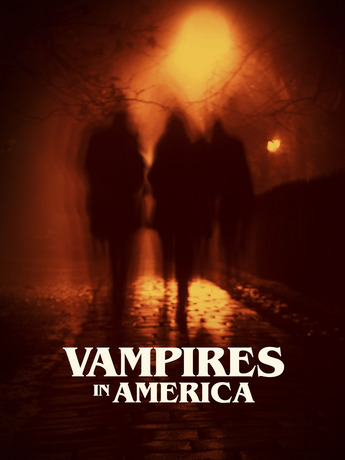
Vampires in America is a spoof documentary in the style of paranormal investigation television series in which two vampire hunters investigate a series of disappearances in and around Tuscon, Arizona.
Although my actual opinion of this show (with a single episode) is that it was just mid, I found such delight in the responses to it that I had to say a little something. It is such a solid parody of the style of television and I love that it was apparently released with no explanation; there is little information I could find about it online, not even having a Wikipedia entry, but what I did find was primarily reviews. These reviews (and occasional forum speculations) insist upon the fakeness of it, comments declaring that the vampire hunters are actors with no shred of irony. My favorite review was someone insisting their grandson lived in Tuscon and no string of murders had actually been reported. I toy with the idea that everyone is in on the joke, or perhaps the viewers are all just very young, but there is something about all these people having a very similar reaction. I spent like an hour just poring over pages and pages of these annoyed-to-irate reviews with great glee. I say all of this to preface my actual response to the show, in which I will evaluate the strength of the parody; suffice to say, if their comments are to be believed, then many people struggle to concretely identify this as a parody.
For one, I think the release decisions seem like a strong choice at first glance, but they open up questions about the intended audience I think are worthwhile. The show was created by Travel Channel and Discovery+. Travel Channel, as the name implies, includes programs on travel (destinations, hotels, and food), but also on ghosts or other paranormal entities; Discovery+ is a subscription service that draws its library from Discovery Channel, Animal Planet, TLC, Travel Channel, Magnolia Network, HGTV, Food Network, Investigation Discovery, CNN, and more. Suffice to say, both companies imply a factual (applying that term broadly) nature to the content, though with all the caveats the label “reality TV” implies. To release the show through these networks insists upon that assumption, that there might be scripted moments and careful editing, but ultimately the story is drawn from life. Contrast that to just about everything in Vampires in America, the acting and production credits of the cast, the absolutely wild hyperbole of the claims (20,000 vampires in the US, only two vampire hunters in the country, detailed and expansive expertise on vampires despite having only seen one between the two leads, to name just a few examples). The disparity between the implicit reputation of the companies funding the show and the content and production itself suggests an almost didactic purpose in creation. I use that word “almost” on purpose, because I think it actually demands the viewers do that work on their own, practicing judgement in order to come to the conclusion it is fake. But I think the question of why this show was made goes beyond that, what exactly it wants its audience to do outside of this single episode.
I have to say, I found the impression of the type of show quite strong. It leaned into exaggeration as necessary, prodding at the audience to question it while delivering serious performances mimicking the delivery on the serious versions of this type of show. It walked the perfect line for impressions—remarkably accurate yet still clearly poking fun. I shout out the performances of the two leads for this, but the script and editing style absolutely play a part in this. A few lines of dialogue or deliveries of that dialogue could’ve been tightened up, but it felt so much like a paranormal reality show at every instance. I have to give kudos for the sort of half-toned down climactic ending. By that I mean that it gave this wild reveal (thousands of vampires in the US waking from hibernation) with these very simple, grounded visuals of a coffin in a shipping container, and then a bunch of shipping containers, which implied a huge number of vampires without ever actually showing any vampires. The form of the show was similarly grounded, presented as a television show but comprised of a single episode; more episodes would undercut the clean parody of it but the content of such a television show would be expected for the release.
In the end, I find myself coming back to the question of the purpose of the parody; or more specifically, because I think one can easily gather the intended effect, the nature of the emotionality behind it. Is this a mean-spirited way to poke fun at audiences who believe what they see on paranormal reality programs, or a not-so-subtle insistence to review the facts before believing it? I lean away from the former due to network involvement and the general tone of the show. The latter seems more likely, especially with Eric Streit’s interview responses, though obviously that veers a bit away from the content of the show that I’m responding to.
A Fantastic Fear of Everything (2012, dir. Crispian Mills)
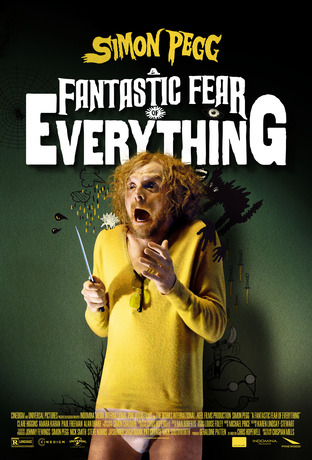
A Fantastic Fear of Everything is a horror comedy about a children’s book author, Jack, who is writing a project about serial killers; his research for this new project propels him into a state of paranoia while a serial killer threatens the neighborhood.
This is the second time I’ve given this movie a try but only the first that I’ve gotten through it, and I think this can be attributed to the disorientation for the bulk of the film. There is something about the way the establishing information is given that is easily distracted by Jack’s paranoid state, making it difficult to get a grasp of where exactly the narrative is going. For a long time, it feels like a series of mainly disconnected scenes until Jack has a specific goal to orient him, at which point the structure becomes easier to grasp. I’ve seen it described as stream-of-consciousness (by Dann Gire) and I think that is the perfect descriptor.
In a similar vein, the fantastical tone was really fun and airy. But it’s also the reason I struggle to see it as related to horror at all, even in the vein of horror comedy. I would go into it with the knowledge that there is fear involved, but the character’s fear is never palpable or translated to the audience as more than fantastic comedy. I don’t think this is an issue with the movie at all, but researching it ahead of time gave me different expectations than I think are warranted; the trailer itself, however, does a fairly good job of showing that this movie is quite airy and magical. It really mimics the feeling of a frightful children’s book, in a way that is genuinely charming.
This is a very particular detail to point out, but the use of music was really interesting, and it illuminates an issue with the humor and cohesion of the movie overall. Like halfway through the movie this presence of music suddenly appears and it’s so distinct from the fantastic tone of the rest of the film in its mundanity; in my notes I even described it as “grounded,” comparatively. But it was a humorous element that felt disconnected from the rest of the movie, and I found that the humorous moments did this sort of often. It certainly wasn’t every time, but I’ll say that the jokes paralleled the narrative in the lack of through line, feeling like jumping between scenes without a core to tie it all together.
Finally, while I said this movie did not really have horror elements, I must give kudos to the sensory hell that was the use of clothing in this movie, both on and off the body. This is a very intentional choice, as the laundrette is a major source of fear for Jack and device in the movie (true and real). The physical reaction my body had to the dirty clothes, the dressing gown outfit, Jack’s big coat—was remarkable. I cleaned my whole flat after watching this movie.
I found this movie perfectly fine, although unlikely I’ll watch it again due to the disorientation and clothing thing. Its fantasy elements were really fun in comparison to the story being told, though I definitely think it could use more to orient it. The only reason I wasn’t utterly lost (just sort-of-lost) was that I watched the trailer and read the logline beforehand.
Adolescence (2025, dir. Philip Barantini)
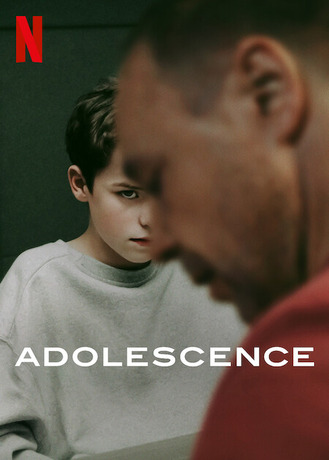
Adolescence is a miniseries of four episodes each shot in a single take that depicts the days that follow the arrest of a teenage boy who murdered his classmate. The episodes follow the response to the event, including the arrest itself, the investigation, a psychological evaluation of Jamie, and the family’s life a few months later.
I was immediately interested in this show the moment I heard of it; the social context the show aims to respond to is ambitious but treated so well by its structure. The specificity of the episodes enables the show to feel grounded in what it wants to communicate, working with snapshot moments over prolonged character development. That each episode is a distinct situation gives a nice variety that allows many angles of the issue at hand to be covered; still, I wish there was a fifth episode to round it out. The second episode mentions a problem with not acknowledging the effects on the victim and her family and friends, yet retains an emphasis on Jamie’s family. I think this works well for what the show wants to do, but I wish there was something more to explore Katie’s life or something else outside of Jamie’s violence. It makes sense to focus on the center of the issue and where the behavior the show is highlighting stems from, but in so doing it still prioritizes Jamie’s experience even when he is not present in certain episodes. But I also think a fifth episode would help to round things out in terms of pacing, whereas the talks of a second season seem excessive.
Of course I must speak on the single shot technique, which succeeded differently based on the different episodes. In the first episode, it worked well to establish the style of the show and create a distinct sense of time that would carry the audience through the rest of the miniseries. It gave a physicality that made the police station feel claustrophobic and dizzying, mirroring the confusion many of the characters felt. I found the second episode was the weakest use of the technique, as it did not allow for a full picture of the social context the kids were in even as it implied it. The emoji thing felt shoehorned in and strangely out of touch compared to the poignancy of the rest of the show. Compared to the emotional precision of the rest of the episodes, this one just did not hit for me, and the single shot only communicated the chaos of the school while it was clear there was more than that at play. I thought the third episode was the best example of this technique by a large margin. The restricted setting, while perhaps less technically impressive, really allowed for this device to shine, once again bringing in that claustrophobia, but now shared by really only two characters for most of the runtime. The ups and downs of the single interview session being so drawn out allowed for real complexity and depth of portrayal, and I thought this was easily the best episode of the season. The final episode I thought also used it pretty well, though mainly in the paralleled driving scenes. I thought exploring the family life further in the future from the initial episode was a solid moment to choose to portray.
So many elements of this show were on point—the performances, the writing, the choreography. It felt so precise, which is why I was disappointed when it also felt unfinished. The final episode was a good spot to end on, which made me want another prior to it. Really, this was a very well done show, with a clear statement of purpose and style that worked well together.
Fear Street: Prom Queen (2025, dir. Matt Palmer)
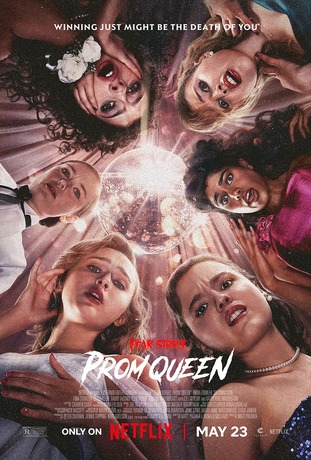
Fear Street: Prom Queen is the newest installment in the Fear Street series released on Netflix. It occurs in the series in a parallel way to the series of books by the same name by R. L. Stine, which is to say it occurs in the constantly spooky/murderous town of Shadyside, through not necessarily with any specified connection to the main trilogy. In this installment in the series, it is 1988 and prom is coming soon—so soon, in fact, that it takes up a majority of the movie. Lori is one of several contestants for prom queen, alongside queen bee Tiffany and her loyal “Wolfpack;” she’s the obvious underdog, unpopular and ridiculed by Tiffany for her killer family history. But she’s also flirting with Tiffany’s boyfriend and has a horror-loving best friend of her own. Starting just before the dance, prom court members and their dates are picked off, though most of the bloodbath occurs during the event.
I have to say, this movie feels exactly like what I imagine a bad Fear Street book is like. I can’t say I’ve read any myself, but I routinely listen to a podcast that reviews them and I feel I’ve gathered the general tone and beats of Stine’s series for YA readers. That means, though, that it is absolutely nothing like the beloved trilogy from summer of 2021, which I have to admit are some of my favorite horror movies of all time—they are a blast, if you’ve never gotten the chance to see them. I hate to compare this to them because they aren’t specifically in the same continuity, but it takes on the name and just about nothing else. All of the strengths of that trilogy—a great cast of characters, fun kills that emulate Stine at his most creative, and an homage of stylistic elements to bring in the decade they occur in while feeling contemporary—are absent from this film. That’s the biggest issue with this movie: how utterly generic it is at every turn.
Now, I love slasher movies; I love the formula, the times when it’s worked around and when it’s not, the room for creative effects (kills) that sort of restraint allows, but this movie just did absolutely nothing with it. It felt utterly devoid of intention at every moment, with nothing to say and no development of characters to make up for it. Despite its clear use of formula, the narrative structure was doing something different. Most of the movie took place during the actual prom, but this made the night feel so strange. I think it wanted to feel endless, and at times it did, but not in a creepy way, more that I was left wondering what time it was throughout most of it. Despite this quirk, it was overall just a blah narrative; it wasn’t doing anything special, and it wasn’t even doing a slasher particularly well.
The genericism was frankly present in every aspect of production, not just the plot… The characters were quite one-note. They were almost high school stereotypes, but they lacked even that basic characterization, and if I’m completely honest, I could hardly tell the characters apart despite none of them looking in any way remotely similar. I’m not going to act like I’m a huge fan of this type of archetype, especially when it comes to things set in the 80s, but at least devote some intensity to it. At times it felt like it wanted to be campy, but the way every character was so dialed back was one of many ways it could not achieve that at all. The lack of motivations was paralleled by the utterly boring costumes; to set a movie in the 80s and give us that is frankly tragic.
Visually nothing truly stood out, but I liked the sort of soft glowy filter effect on many of the shots. It was cool. But then I looked up the cover for the book it was based on (according to Wikipedia, although the plots seems pretty different) and there is more personality in that cover than the entire movie. I was also fascinated by the dance battle… What a scene, I really can’t describe it. There’s something about going from a very boring prom night to a sudden dance battle that should immediately capture my attention and it just does not at all. And I say “dance battle” but that’s not exactly the best name for what happens in terms of choreography. With that said, it was the highlight of the film. In contrast is that twist. I don’t love to rewrite the movie in my responses, but I think it would’ve been better if the whole ending with Tiffany had been played straight rather than “surprising.” As it is, the twist was fully expected, but at the same time it was really underwhelming. For a moment, I thought at the very least we would get a little development of Tiffany and Lori’s relationship, but it just made their characterization blander than it already was somehow.
As a sequel to a really fun series and a movie on its own, this film just did not do it for me. It lacked everything needed to make a fun slasher, or even just an interesting plot. It was set in the 80s, but it barely felt like it, generic in every way. There are a couple moments that make it feel like it wanted to be camp, but it is not at all.
鬼才之道 / Dead Talents Society (2024, dir. John Hsu)
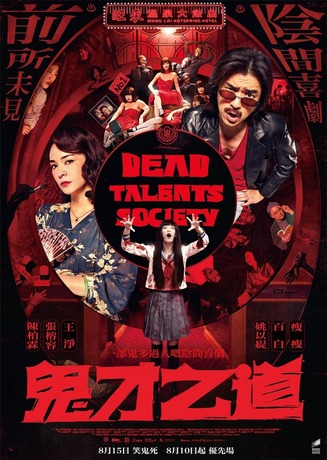
Dead Talents Society presents a world in which ghosts can become celebrities. After they die, ghosts can receive a license to haunt, and the scariest, most popular figures achieve massive fame. It also allows them to stick around after they start to fade, a benefit the rookie really needs as she’s not ready to disappear. Despite her lack of innate talent, she’s taken on by the famous Catherine’s haunting company, which has recently lost business to an underhanded competitor.
I found this movie completely by luck and I am so glad I did—I loved it. It is so fun to watch, the stylization is excellent, and it has a heartfelt core I appreciated. I had no idea what to expect going in as I didn’t even read a synopsis, but the opening set of scenes really captured my attention. They present this glamorous celebrity who for a moment you assume is a movie star, until she starts speaking about her death. Immediately we’re thrust into this world of famous ghosts with lifetime stars, protegees, and backstabbing. It’s a genuinely interesting world to set this movie in and I think the film format allows us to explore it in the best way. It enables a focus on story or characters I don’t think you would get with a book or television show, and I appreciated how the medium complemented the story so well.
Visually, this movie had a distinct style I really liked. It had a funky editing style, beautiful color language (the red for scary moments was used so well), and classic yet dramatic ghost costumes. But the thing I really loved about it was the use of technology in all this. Introducing ghosts with phones who glitch when they disappear is normally something I would veer away from; I just personally struggle with the incorporation of technology into a more traditionally paranormal story (I’ll also admit that I just don’t like a lot of phone usage in media in general; the way the characters in The Umbrella Academy just inexplicably don’t have cell phones is honestly one of my favorite things ever). But this movie used it so well. It felt so distinct and complemented the world of the movie really nicely. Plus the glitching to represent disappearing made the ghosts feel contemporary and integrated the technology into their lives in a way that felt real without being heavy handed.
This movie is great. It’s very funny, so sweet, and also beautifully paced. The story felt exactly right for an hour and fifty minutes, blending elements of comedy, heart, and semi-scares (that is, the iconography of scares). The movie is full of references and homages to other scary movies, but the concept still feels fresh and exciting. It uses the (look of) horror in order to communicate its message about work and celebrity. I would totally give this one a watch if you’re looking for something fun.
Final Destination Bloodlines (2025, dir. Zach Lipovsky and Adam Stein)
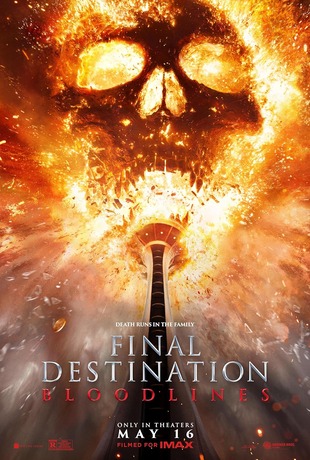
Nearly a decade and a half following the prior film’s release, Final Destination Bloodlines breathes new life into the infamously suspenseful franchise with a story of generational trauma, supernatural visions, and death. It follows Stefani, the granddaughter of Iris, who in the style of the films saved hundreds of lives after she had a vision of a building collapsing in the late 60s. In the years that followed, Death came back for those saved lives, though it took generations to reach Iris’ family; this means that many of those people had children, who also had to die. Stefani has been dreaming of the vision her grandmother had all those years ago, and reconnects with her family only to learn of their imminent demise.
If you’re at all familiar with the franchise, you likely notice that this film’s description involves quite a bit more substance than you may expect from a Final Destination movie; this is absolutely true to the film, which is vastly more fleshed out than any of its siblings until this point. A bit about my history with this movie—this was the first horror franchise I fell in love with as I was getting into the genre. Obviously the plots and characters aren’t the driving force behind the films, but they genuinely have such a solid grasp on suspense and excitement that really draws you in. The fifth and most recent movie until this one makes the most use of characters and lore to tell a comparatively captivating story, but it still focuses on those classic sequences the franchise is known for. This entry, in contrast, prioritizes typical narrative focus in an entirely new way in the series, and it really, really works.
I’ll admit that when I heard the story was more fleshed out and the lore explored, I was hesitant. These movies are a blast if you’re into the tension (and gore of the later films, to mixed levels of quality) they present, but narratively and character-wise they are severely lacking. They do, however, have pretty straightforward lore, and do a wonderful job of never actually explaining where that lore comes from, which demands trust and suspension of disbelief in a way I really enjoy. This movie takes the lore and draws just one thing out of it—time. It’s such a small thing compared to the myriad of questions the Death presented in the films beget, but makes for a solid plot that captures a generational story very nicely. I also love a small detail but one that really works cleanly; you have a clear sense of how Iris affected her family in her (accurate) paranoia, but there’s also a throughline of women physically distancing themselves from their family. It brings a groundedness to the kind of wounds Iris left behind and the comparison of these three women (Iris, her daughter and Stefani’s mom Darlene, and Stefani herself) creates a lovely roundedness to that whole theme.
My absolute favorite part of this movie was the family. I was worried about such a large cast, but pretty much everyone immediately captured my attention. I loved their rapport and them individually; there was a solid balance of characters and their time on screen, so each of their deaths genuinely felt impactful and upsetting. I was rooting for them the whole time, even though I knew exactly how it would end. A really nice balance was struck between these, because I was simultaneously excited to see the death sequences (the whole draw of the films) and wishing they would make it through somehow. The grief the family went through was prominent but appropriately distant, so that the effect of the deaths was felt but the story and characters remained focused on the premise of the film. Overall, the film just did a really nice job of balancing the different story elements to make it work—the themes and the character development, the excitement and the hope, the emotions and the action.
I say all of this with the very clear implication that I think this is the best Final Destination film. But I would be remiss to mention the one major pitfall of the movie: the death sequences. I knew to expect poor effects in service of gore; the later films before this absolutely fell into that pattern. But they retained their skills of suspense, which I have to say this film did not. Some of them worked: Iris’ original vision, Uncle Howard’s death (though a bit textbook), and Erik’s incident in the tattoo shop (actually, this was my favorite death sequence in the movie!). But I felt like others needed a bit more to draw out the tension. Most of them just felt very quick, and the single one that was slower paced (in the hospital) just completely lacked any tension, because you knew exactly what would happen. The Rube Goldberg quality and suspensefulness of the death sequences are the best part of these movies, and this one did not consistently deliver that.
This was my favorite film in the franchise but I’ve had this nagging feeling for a while now… I really like horror movies about families, so when reboots bring in this elements I like it a lot. And I like one specific example of it the most, which brings me to the thought rolling around in my head since I left the theater: that this movie felt just like Scream V and VI to me. I decided to give a little credibility to myself for the inkling and do some research, and I learned that all three movies were co-written by Guy Busick. And I have to say, I really like his writing. The Scream franchise is my favorite franchise, favorite horror movie, and up there in my favorite movies of all time; I was blown away by the quality of the reboot and in fact the most recent one is my favorite of the franchise. Busick also wrote Ready or Not, which is easily in my top horror movies. I learned that I am a huge fan of this guy, so of course I enjoyed this movie, but that also substantiates a small criticism of this movie, which is that it felt really similar to his other works. According to his Wikipedia page, this movie and Scream VI seem to have been written very close together, and I think it shows in the voice of the main characters. Their stories and performances really aren’t similar, but the nature of their familial conflicts and how the themes connect to the story are. With the variety found in his other projects, I am a little disappointed to know just how alike these are, but again it’s a pattern I enjoy a lot, so I can’t actually complain too much. And in the end, it was different enough in subject matter, visuals, and performance that I enjoyed this movie.
Sinners (2025, dir. Ryan Coogler)
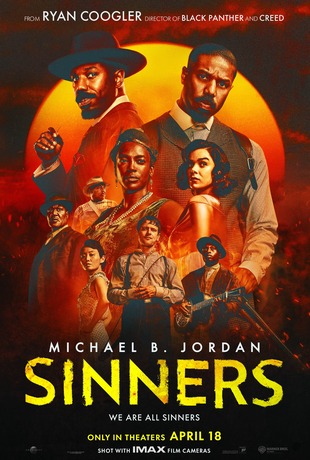
Sinners presents a classic vampire story set in a single day in 1932 in Mississippi, on which twin brothers set up a local juke joint for its opening that night. Roughly the first half of the movie details the social lives of the twins and their cousin Sammie as they go around town setting up their business, then shifts in tone once vampires show up at the doorstep of their establishment during the festivities.
I am so glad I got a chance to see this movie in theaters because when I saw the trailer for it, I was not at all interested. Watching them back after seeing the movie, I understand exactly what they were going for with the emphasis on sound in the edit and how the lore of the vampires works in the more realistic part of the setting. But the way both main trailers draw visuals from the climax of the movie and select dialogue clips emphasizing the unexpectedness of the vampires (for example, the line “I ain't never seen no demons. No ghosts. No magic. Till now.”) make it seem so fantastic and focused on the action, while the actual movie is considerably more grounded thanks to the drama it starts out with. A shift in tone is present, but expected due to the marketing and also how the vampires are set up in the earlier parts of the movie, as well as earned in terms of narrative structure. I’d actually argue that early emphasis on characters and their lives is what makes the vampires’ presence so impactful, in addition to the clear allegory they present. If this movie was, as the trailer suggests, all about the vampire confrontation, it would severely lack in the quintessential heart and themes of this film, which are absolutely stellar.
The themes are so well thought out in a way that seems typical of Ryan Coogler’s films, but is nevertheless consistently rewarding and exciting. They are implemented in every single aspect of the film: the dialogue, the plot, the performances, the visuals, the sound, the editing. It is utterly incredible how thorough and detailed this movie is, without ever feeling overwhelming or over-explained. Structurally, this movie works so well as it gives itself time to establish a very clear community for the plot developments to occur in, and the limited timespan allows for this to occur via reference to past moments where the effect is still being felt on the day on which the movie takes place. We get such a clear picture of every single character, how they know each other, how they feel about each other, what motivates them both immediately and broadly, their current struggles—literally everything. So when the movie takes on this horror structure we often see of an outside threat coming into a community and people physically stuck in a building coming to a consensus about how to proceed, it is so completely rewarding as we already understand the characters and what is determining their thoughts and actions in those moments.
This is further explored in the choice of setting and vampire lore. I am picky when it comes to vampire rules, and Sinners goes classic: garlic is painful, stake through the heart kills, they must be invited in, they butn in the sun. And it does so to such success, but it also brings in a more idiosyncratic quality in the mind-melding. This was not something I was expecting, but it worked both narratively and thematically so beautifully. It was really cool that amidst these classic vampires, we got to see something unique and novel. It also draws on some of the classic narrative fears that vampires embody in literature and film: worries about people outside of a community, comments on exploitation of vulnerable people, and anxieties over death and immortality. It treats these ideas with such earnestness and understanding, discussing legitimate issues through this supernatural lens. I don’t want to give too much away, especially because I think it recontextualizes the whole movie in a really fascinating way, but the reveal in the end credit scene rendered me completely speechless. You see the hints of the idea it posits throughout, catalogue them to mention to your friend later to discuss, but don’t at all expect them to come to such a clear endpoint. And when they do it’s so, so, so rewarding. The setting provides a similar reach to the vampire lore. Obviously historical horror is really potent with themes a lot of the time, and this movie knows it and uses that to its advantage every step of the way.
Finally, the smallest details of this movie were just as important as more often notable ones. Specifically the sound editing was incredible. It makes sense, absolutely; this is a movie largely about music. The cultural questions it introduces are clearly expansive, but focused on music both in terms of narrative device and lore. The specificity of music enables the film to be clear in what it wants to say as well as impactful. In case it’s not obvious, the soundtrack is amazing… But the sound editing is also incredible. There is this one scene early on that involves a story being told with audio behind it and my jaw legitimately dropped—the way it tied in and the way it lingered, oh my. Just one of several times in this movie I got literal chills. If you have the opportunity to see this in the theater, I would absolutely recommend it. It is beautiful and haunting to hear the careful use of sound with such emphasis and crispness. This is complemented by beautiful visuals and cinematography; I was enamored the entire movie.
This is easily my favorite film of the year so far; I’m already tempted to go see it again. Everything about this movie is so good. Everybody who worked on it did such an amazing job. It is detailed, emotional, haunting, beautiful…. The list goes on. This movie is stunning. It brings in historical setting and classic vampire lore to do something so profound and poignant. I left the cinema unable to think about anything else. My friend and I were just sort of listing details that we noticed and discussing how they fit into the grander narrative; this movie rewards a careful viewer with a complex, nuanced story, solidly rooted in gothic themes and setting.
Hacks, Season 4 (2025, created by Lucia Aniello, Paul W. Downs, and Jen Statsky)
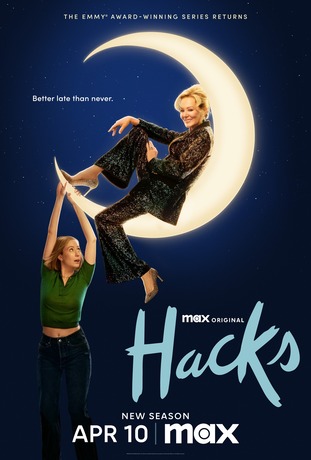
Hacks is the story of Deborah Vance and Ava Daniels, a world famous comedian and her writer, as it explores Deborah’s career at a certain point in her life. The fourth season begins as Deborah has achieved the biggest goal of her career, though it took some deviousness to get there, and Ava is willing to use her knowledge of that to advance her own prospects.
This show is so good. It is easily in my top three favorite comedy shows of all time, and my favorite current one by a lot. I think the thing that makes it really stand out, aside from the distinct and hilarious voice of the show, is that it is a true dramedy. It is funny as all hell, but it explores complex relationship dynamics with such expertise and affection that there is really nothing I can compare it to earnestly, at least that I’ve seen. This season continues with the unique sense of humor and dramatic moments, though I will have notes about the pacing/episodes that stood out to me.
For the most part, this season is doing pretty much everything that its predecessors did. Its best quality is the dynamic between the cast of characters. The show in general is dedicated to remarkably complex women characters to such a notable degree. The interpersonal dynamics are the core of the show, but I struggle to explain the nature of the emphasis on them and the extent to which they impact it. These are really, really strong characters, just exemplary work in that regard. I am in general fascinated by the way comedy shows lean into the cartoonishness and outlandishness of the characters they initially present, but the drama aspect of this show means that there is a grounded emotional reality even while situations may be absurd. That is, even when they are absurd, it’s coming from a perspective not of comedy tropes or amusement but the specific social landscapes the characters are entrenched in. That’s not to say that tropes are absent, but that they’re careful and fleshed out well. Take Kayla for example, played by Megan Stalter. She embodies a fairly standard wealthy, ditzy character, and despite the exaggeration, she is consistently funny and (eventually) functional. Her character really gets to shine this season, exploring a new job and adding such depth to an otherwise fairly generic stock role. The leads are the prime example of this complexity, tested at every turn in their personal values and relationships; this season allowed for a new dynamic due to the events in the finale of the previous one, and it was so interesting to see what changed and what remained the same. The way that the two lead characters have influenced each other make for the most dramatic moments of the show, especially so in this season.
The complex characters and themes explored in the show somehow never detract from its comedic voice. This is in part because the showrunners know when to lean away from comedy for dramatic moments, but the inherent tone is never absent for long. The other part is the style of comedy. The cadence of the jokes is what really gets me, but there is this consistent mix of grounded and absolutely wild moments that creates a sense of nonchalance amidst very dramatic and emotional characters and moments. It’s really fun—every character is able at some point to play the role of the straight man, and then a scene later exhibit such idiosyncratic ridiculousness that it would be difficult to believe that moments before they’d been the voice of reason, had the show not already been so dedicated to demonstrating complexity in its characters. It’s a mix of situational and dialogue-based humor that blends to create a truly fun and engaging world.
This season in particular came at such a distinct moment in the course of the show, with Deborah having just achieved her biggest dream of all time at roughly the same time Ava betrays her trust (having just been betrayed herself, naturally). I think overall the progression of events made a lot of sense and worked with the plot that had been established, but something about the pacing felt off to me. The episodes have always been episodic, at least for the most recent two seasons they were released weekly, but these episodes in particular felt a little… contrived, perhaps? In the sense that the plot and character development were there, but often it seemed like solving the problem of each episode could have only been done with the specific situation that was occurring, rather than interior character choices and realizations driving the solutions. The second half of the season in particular felt a little like, this is the Vegas episode, this is the family episode, this is the guest star episode. It makes sense due to the nature of television, but there was a lot of jumping around with ideas that felt more cleanly integrated in the other seasons.
Despite that small gripe, this season was a great follow up to the other three. It continues the story and allows it to constantly develop; it’s very clear there was a plan going into this show, or at least room to make things bigger and different while retaining its voice and ideas. If you haven’t given this series a chance yet, I would absolutely recommend it. It’s hilarious, the music is incredible (both soundtrack and needledrops), and it has such complexity in its humor, characters, and plot. I am so excited to see where the final season takes us.
